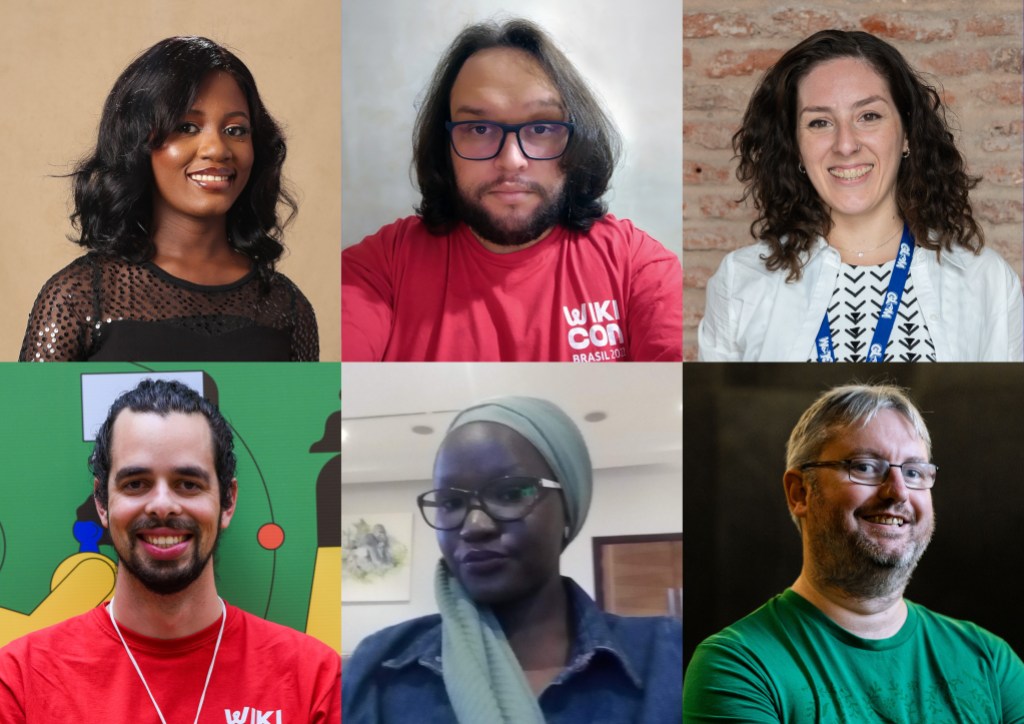
Wikimedia regularly takes part of Outreachy as a mentoring organization, which is currently in Round 27. Outreachy is an internship program for people systematically underrepresented in open-source and open science projects. Two of the selected projects for Round 27 are coordinated by Wiki Movimento Brasil (WMB). They connected Outreachy interns Oyindamola Olatunji and Alwoch Sophia, from Nigeria and Uganda, with two Brazilian initiatives co-mentored by Éder Porto, Andi Inácio, Alberto Leoncio, Jan-Bart de Vreede, and Mike Peel.
The Wikimedia and Outreachy partnership has so far run 97 projects, as of 2024. These internships are bridging the free and open-source inclusion gap. Collaborative work between Wikimedia projects and other open-source communities is an empowering form of capacity-building. In this experience, our projects fostered peer learning between team members, all working on collaborative solutions for the Wikimedia Movement.
Each of the Capacity Exchange (CapX) and the Lusophone Technological Wishlist projects aims to help solve important technological bottlenecks within the Wikimedia Movement. CapX is an effort to establish a sociotechnical solution for wikimedian capacity building, globally. And the Lusophone Wishlist addresses priority topics, particularly for the Portuguese-speaking community, but with solutions that can be applied to any wiki.
Taking part in round 27 of the Outreachy program, the mentors of Assist Capacity Exchange Development and Addressing the Lusophone technological wishlist proposals opened their projects to a one-month contribution phase, with 58 applicants working through sets of starting tasks. Thereafter, candidates are selected based on the quality of their contributions, overall considering diversity criteria.
We welcomed two remarkable interns, Oyindamola Olatunji and Alwoch Sophia, young and brilliant software developers, respectively, from Lagos (Nigeria) and Kampala (Uganda) (see Oyindamola and Sophia‘s Introductions).
From December 2023 to March 2024, Oyindamola worked on writing unit tests for Django Apps, as well as envisioning and implementing a bug reporting app for Capacity Exchange pilot software. At the same time, Sophia worked on addressing two of the 15 proposals submitted to the Lusophone Wishlist: building a tool that checks external links on a Wikipedia page and disabling rollback on edits done by active Wikipedians. They have been posting their progress and struggles on their personal blogs (check Sophia and Oyindamola’s blog posts on “Everybody Struggles”).

File:Ferramentas WMB (Outreachy Round 27).jpg, CC BY-SA 4.0
The Outreachy program aims to provide interns with an opportunity to not only enhance their technical proficiency, but also experience the culture of open-source communities, such as the Wikimedia Movement. The CapX and Wishlist interns were invited to create a Wikimedia account, study the MediaWiki dynamics, and explore wikimedian initiatives in their region. By this means, they could better understand the target audience of the software development activities they were carrying out (for instance, read Oyindamola and Sophia’s reflections on “Think about your audience”).
Looking back on the three-month internship, each intern shared their perspective:
“It was an exciting moment for me when I started contributing to a project that will support the free exchange of knowledge and resources within the Wikimedia Movement. Working with my mentors on the Capacity Exchange project is an experience that has helped shape my career with the learnings and guidance. I have also got a chance to connect with my local wikimedia community”.
Oyindamola Olatunji, February 2023.
“This internship has made me appreciate the work that goes into bringing Wikipedia to life. It’s a community. There are so many people dedicating their skills and time to uphold Wikipedia’s mission of disseminating free knowledge, and I am honestly grateful for the opportunity to be a part of it”.
Alwoch Sophia, February 2023.
Mike Peel recently also shared his experience mentoring Wikimedia projects, not only in Outreachy, but also in other FOSS programs. For the mentioned projects coordinated by WMB, we implemented a tip he mentioned: co-mentoring. Collective mentorship helps interns experience different points of view and have more assistance when needed, all in a safe environment for learning. Since learning is not a one-way transfer of knowledge, but a two-way experience, mentors also learn from their peers, be they interns or co-mentors.
The Wishlist and CapX projects not only encourage collaboration and peer learning; they also implement another aspect of the Movement Strategy by emphasizing the need for imaginative and innovative thinking about the movement’s sociotechnical infrastructure. One deals with the implementation of technical solutions to community problems and the improvement of user experience (Movement Strategy recommendations 2 and 9), and the other intends to build an interactive, online platform where people can share knowledge and build capacity (recommendation 6).
Round 27 of the Outreachy program helped each project, intern, and mentor get closer to their goals. We have accomplished intense and rich knowledge exchange between all team members. As for the Wikimedia Movement, it won two excellent contributors (claps for Oyindamola Olatunji and Sophia Alwoch!). We would like to add an exceptional thanks to the Wikimedia-Outreachy partnership organizers, Onyinye Onifade and Sheila Karuku, whose amazing support helped the success of the running projects.
Although the Outreachy internship ran its course, the Capacity Exchange and the Lusophone technological Wishlist continue to implement software development activities. We are open to contributions from interested parties. If you wish to support us, get in touch! You can reach us and follow our activities on the following meta pages: Capacity Exchange and Lista de desejos tecnológicos.

Can you help us translate this article?
In order for this article to reach as many people as possible we would like your help. Can you translate this article to get the message out?
Start translation